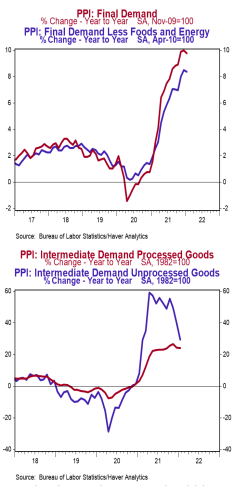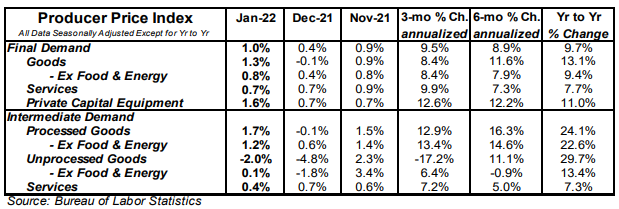- The Producer Price Index (PPI) rose 1.0% in January, well above the consensus expected +0.5%. Producer prices are up 9.7% versus a year ago.
- Energy prices rose 2.5% in January, while food prices increased 1.6%. Producer prices excluding food and energy rose 0.8% in January and are up 8.3% in the past year.
- In the past year, prices for goods are up 13.1%, while prices for services have risen 7.7%. Private capital equipment prices increased 1.6% in January and are up 11.0% in the past year.
- Prices for intermediate processed goods rose 1.7% in January and are up 24.1% versus a year ago. Prices for intermediate unprocessed goods declined 2.0% in January but are up 29.7% versus a year ago.
Implications:
Inflation, inflation everywhere, what’s the Fed to do? Today’s report on producer prices adds to already overwhelming data signaling the Federal Reserve should pursue an aggressive path of rate hikes in 2022. While concerns over rates – as well as Russia – may make the ride bumpier for market participants, the key risk today is not that the Fed acts too fast, but rather that it hesitates and falls even further behind the inflation curve, necessitating larger and faster moves in the future. Looking at the details of the January report, producer prices rose 1.0%, the largest increase in eight months (and that’s saying something, with inflation up at a near double-digit pace over the past year). Services led the overall index higher, rising 0.7% for the month, as everything from outpatient hospital care to wholesaler margins on machinery, jewelry, footwear, and travel accommodations show how broad-based inflation pressures remain. Goods prices rose a hefty 1.3% in January, as costs for automotive inputs continue to rise, while both food and energy costs ticked higher. It simply doesn’t matter how you cut it or which inflation gauge you prefer, they all show inflation running well above the Fed’s target, and have the central bank on its back foot trying to combat the results of excessively loose monetary policy and unprecedented (and largely unnecessary) fiscal stimulus in repose to shutdowns that never should have happened. You quite simply can’t put 40% more money into the system – while incentivizing people to stay home from work – and expect there not to be consequences. The U.S. economy will continue to grow in 2022 as businesses reopen, the labor market heals, and healthy consumer and business balance sheets promote further capacity to spend. It is now on Fed policymakers to step up to the plate. Will they have the fortitude to do what needs to be done in the year ahead? Time will tell. In manufacturing news this morning, the Empire State Index, a measure of New York factory sentiment, rose to 3.1 in February from -0.7 in January. Look for a continued rebound in manufacturing activity in the months ahead.





